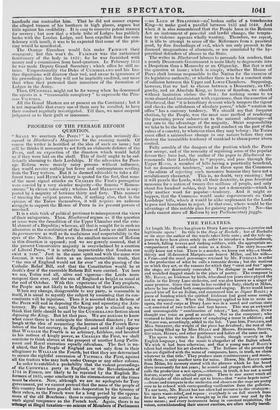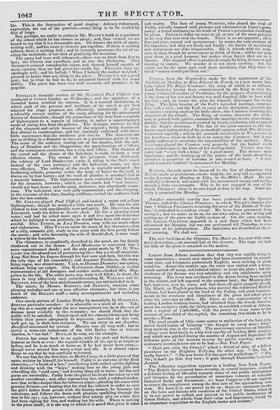THE THEATRES.
AT length Mr. Buns has given to Drury Lane an opera--a genuine and legitimate opera! Its title is the Siege of Rochelle; but of Rochelle or its siege the author of the words takes little note ; and the title ap- pears to have been given solely in order to introduce a bombardment, a breach, falling towers and rushing soldiers, with the appropriate ac- companiment of smoke and noise as a finale. The story is--we really know not what. There is a murder, we know not why—a blood- thirsty and ill-favoured Marquis—an honest Miller, and his wife— a Friar—and the usual personages retained by Mr. FITzBALL in order to the production of what he calls a romantic drama ; but the motives on which they act, or the reasons for which they "strut and fret" upon the stage are dextrously concealed. The dialogue is sad nonsense, and wretched doggrel stands in the place of poetry. The composer is Mr. BALFE, an Irishman by birth, who about ten years since played the violin in the Drury Lane orchestra, and was also known as a singer of some promise. Since that time he has resided in Italy, chiefly at Milan, where he has studied both composition and singing. BONN would have passed him off for an Italian, and announced him as Signor BALFE ; a piece of humbug which the spirited Irishman had good sense enough not to acquiesce in. When the Manager applied to him to write an opera, the vocal corps at Drury Lane was in a novel and curious state —it consisted of two trebles and four basses. This was an awkward and unmanageable "combination of talent ; " but, doubtless, lit:Nil thought one voice as good as another. Not so the composer; who ventured to hint the expediency of employing a tenor in addition ; and WiLsoa was, accordingly, added to the list. Upon him, PHILLIPS, and Miss SHIEREFF, the weight of the piece has devolved ; the rest of the parts being filled up by Miss HEALY and Messrs. BEDFORD, SEotnuv, GleBILEI, HENRY, and other gentlemen and ladies of the same rank. The opera is written in English words, though scarcely in the English language ; but the music is altogether of the Italian school. We wish it had been otherwise, and that a young man of BALER'S talent had studied his art elsewhere. The Italians of the present day who are dignified with the name of composers, have, in truth, no claim whatever to that tile. 9 They produce mere reminiscences ; and music, with them, is only another term for noise. Hence, Mr. BA LIE comes from Milan, his memory stored with the phrases which he has heard there incessantly for ten years ; he assorts and groups them afresh, and calls the production a new opera,—whereas, in truth, it has not a novel feature, scarcely an original passage. There is one secret which all the disciples of this school are apt to learn—that "noise begets noise" —drums and trumpets in the orchestra and shouts on the stage are pretty sure to be echoed with corresponding vociferation from the galleries. To our taste, Mr. BALFE has too often had recourse to this stratagem : his opera wants relief; and repose : everybody is on full stretch from first to last, every piece is wrought up in the same way and by the same means ; and every instrument being in constant requisition, the voices, notwithstanding their utmost exertion, are often wholly inaudi-
ble. This is the destruction of good singing : delicacy refinement, expression, Are out of the question—every thing is to be carried by dint of lungs.
But, perhaps, we ought to estimate Mr. BALTE'S work as a specimen of the school which he has chosen to adopt ; and, thus viewed, we are bound to say that it is a favourable one. He knows the trick of opera. writing well; and his score is cleverly put together. If there is nothing refined, there is nothing dull ; and be certainly possesses the art of ex- citing the multitude, if not that of gratifying the musician. The opera had been well rehearsed—there was no hitch from first to last ; the Chorus was excellent, and so was the Orchestra. Miss SHIRREFP evinced considerable talent, and showed herself capable of more exertion than we bad given her credit for. PHILLIPS Sung ex- ceedingly well; and his ballad, "When I beheld the anchor weighed," pleased us better than any thing in the piece. WILSON'S S not a good part ; but in what he had to do, he acquitted himself with his usual ability. The piece has been very well received, and promises to be popular.



























 Previous page
Previous page